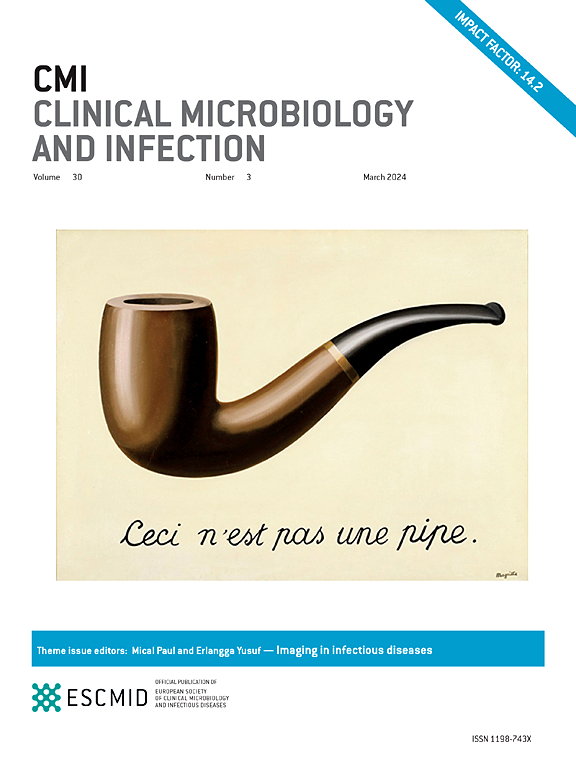根除社区发病的 MRSA 携带:叙述性综述。
IF 10.9
1区 医学
Q1 INFECTIOUS DISEASES
引用次数: 0
摘要
背景:耐甲氧西林金黄色葡萄球菌(MRSA)定植会增加患者和健康人的感染风险。事实证明,去势疗法可减少金黄色葡萄球菌感染,但有关个别去势策略对社区发生的 MRSA 携带的有效性的数据却很少:本综述旨在总结有关消除社区初发 MRSA 携带者 MRSA 定殖策略的证据:资料来源:在Pubmed数据库中搜索了从开始到2023年7月有关根除MRSA的研究:事实证明,局部治疗对鼻腔携带和暂时性减少负荷有效。莫匹罗星鼻软膏与洗必泰沐浴露联合使用,对社区中的鼻腔 MRSA 携带者也非常有效。对于鼻腔外定植的患者,与单纯的局部治疗相比,加用口服抗生素可能会提高成功率。有关鼻腔外 MRSA 脱落的系统治疗研究在抗菌药物、治疗持续时间和对照组方面存在很大的异质性。大多数证据支持使用利福平和另一种抗菌剂联合进行局部治疗。使用益生菌进行去殖民化治疗是一种很有前景的新型非抗生素策略。不过,在 MRSA 感染率较低的国家更有可能实现长期去殖民化,因为在 MRSA 感染率较高的情况下存在重新殖民化的风险:在决定是否对个别患者进行社区型 MRSA 根除治疗时,应综合考虑治疗目标(在医疗机构中短期减少细菌量与在社区环境中长期根除细菌量)和成功去殖民化的可能性。后者受到治疗失败的个体风险因素和再次感染风险的影响。在鼻腔外进行长期去菌落治疗时,应结合使用全身性抗生素。要确定最有效的 MRSA 全身抗菌剂,还需要更多的研究。本文章由计算机程序翻译,如有差异,请以英文原文为准。
Eradication of community-onset Methicillin-resistant Staphylococcus aureus carriage: a narrative review
Background
Methicillin-resistant Staphylococcus aureus (MRSA) colonization increases infection risk in both patients and healthy individuals. Decolonization therapy has been proven to reduce S. aureus infections, but data on the effectiveness of individual decolonization strategies in community-onset MRSA carriage are scarce.
Objectives
The aim of this narrative review was to summarize the evidence on strategies for the elimination of MRSA colonization in community-onset MRSA carriers.
Sources
PubMed database was searched for studies on MRSA eradication, from inception to July 2023.
Content
Topical therapy is proven to be effective in nasal-only carriage and in temporary load reduction. Mupirocin nasal ointment in combination with chlorhexidine body wash is highly effective in nasal-only MRSA carriers in the community as well. In patients with extra-nasal colonization, addition of orally administered antibiotics likely increases success rates compared with topical therapy alone. Studies on systemic treatment of extra-nasal MRSA decolonization are subject to a high heterogeneity of antimicrobial agents, treatment duration, and control groups. The majority of evidence supports the use of a combination of topical therapy with rifampin and another antimicrobial agent. Decolonization treatment with probiotics is a promising novel non-antibiotic strategy. However, achieving long-term decolonization is more likely in countries with low MRSA prevalence, given the risk of recolonization in a context of high MRSA prevalence.
Implications
The decision to pursue community-onset MRSA eradication treatment in the individual patient should be based on the combination of the treatment objective (short-term bacterial load reduction in health care settings vs. long-term eradication in community settings), and the likelihood of successful decolonization. The latter is influenced by both individual risk factors for treatment failure, and the risk of recolonization. The addition of a combination of systemic antibiotics is rational for extra-nasal long-term decolonization. To determine the most effective systemic antimicrobial agents in MRSA decolonization, more research is needed.
求助全文
通过发布文献求助,成功后即可免费获取论文全文。
去求助
来源期刊
CiteScore
25.30
自引率
2.10%
发文量
441
审稿时长
2-4 weeks
期刊介绍:
Clinical Microbiology and Infection (CMI) is a monthly journal published by the European Society of Clinical Microbiology and Infectious Diseases. It focuses on peer-reviewed papers covering basic and applied research in microbiology, infectious diseases, virology, parasitology, immunology, and epidemiology as they relate to therapy and diagnostics.

 求助内容:
求助内容: 应助结果提醒方式:
应助结果提醒方式:


